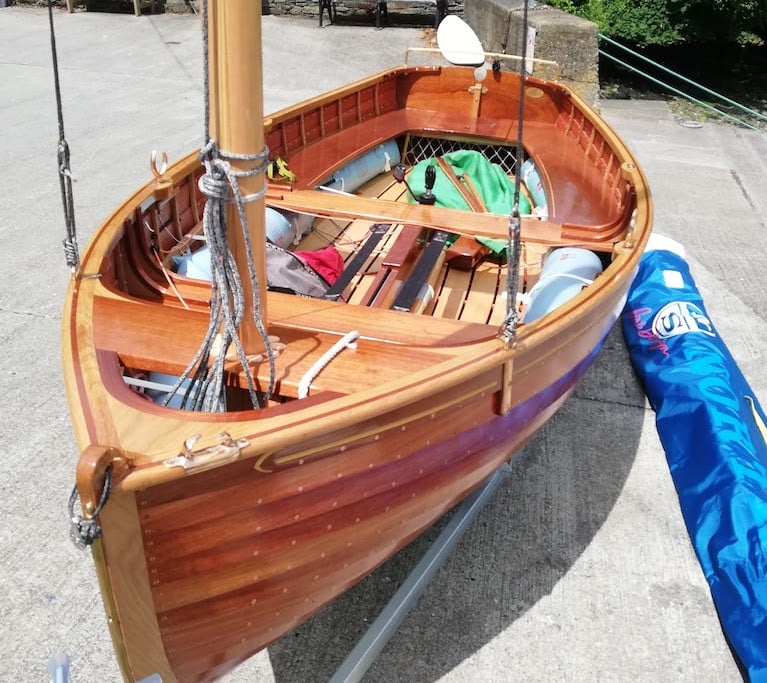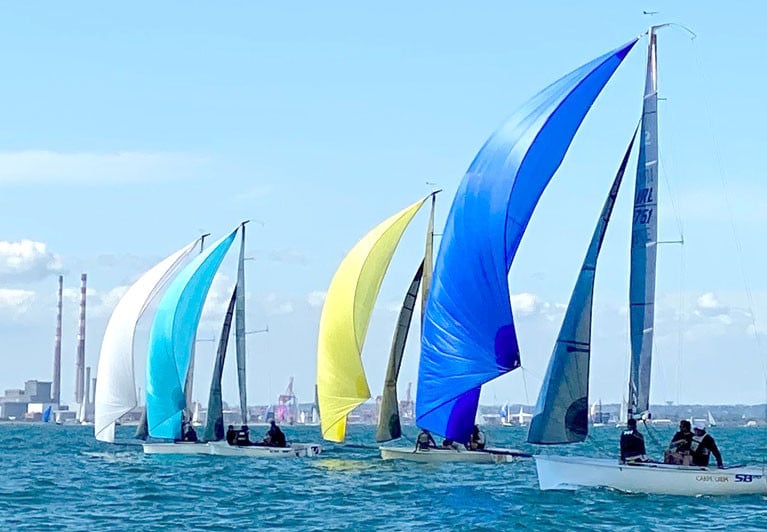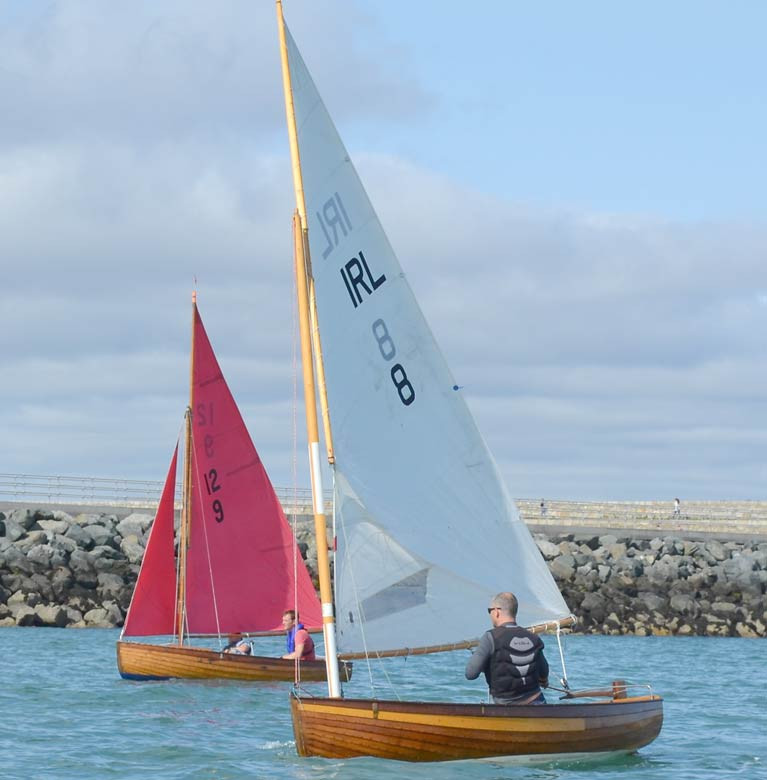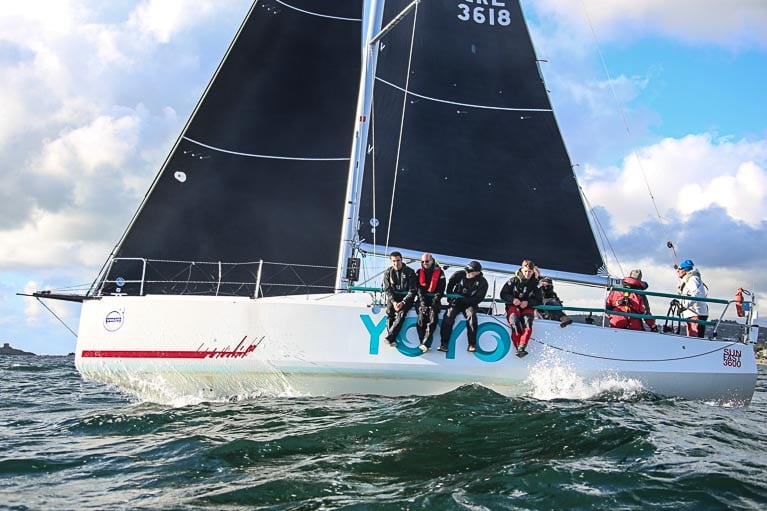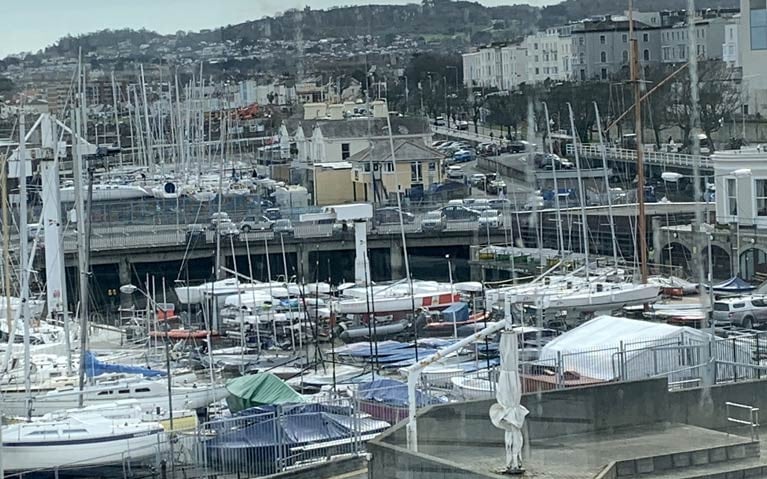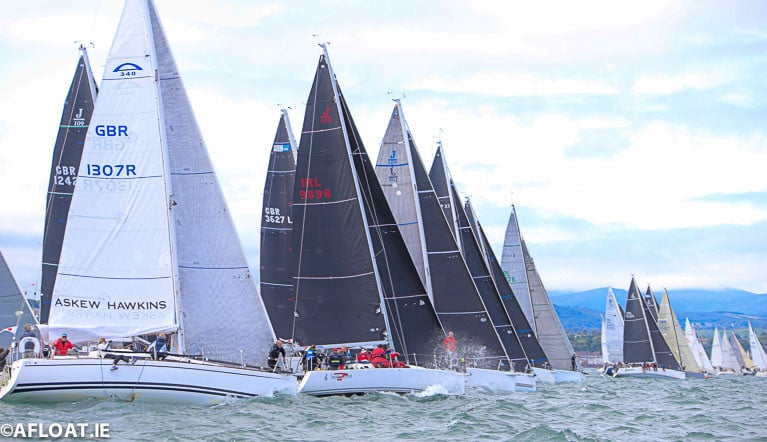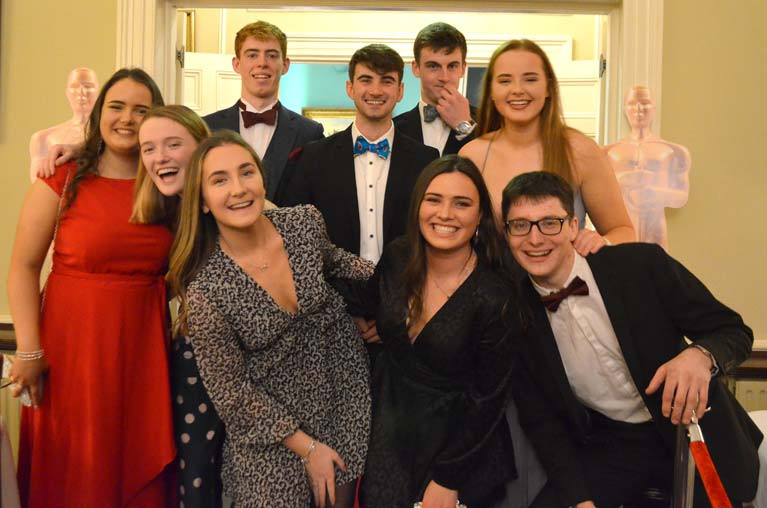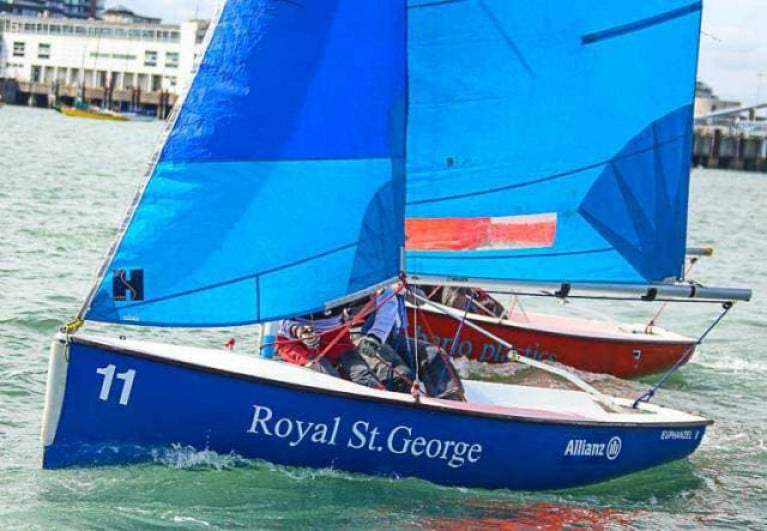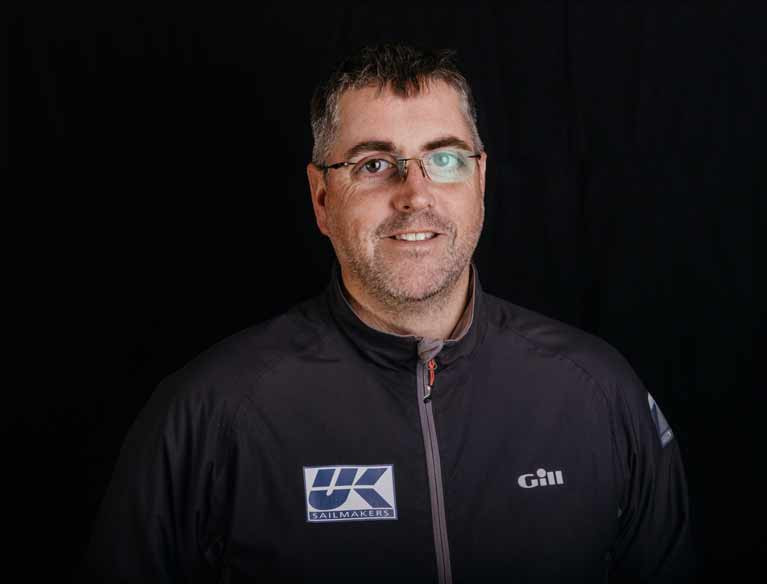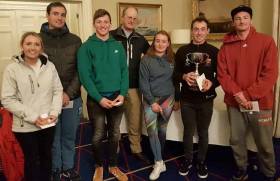Displaying items by tag: Royal St George Yacht Club
International 12 Dinghies To Celebrate New Arrival at Revived Royal St.George Yacht Club Championships
As the International 12-foot class prepares to celebrate the tenth anniversary of its revived championships next week in Dun Laoghaire Harbour, the historic dinghy class is also welcoming a new arrival.
A new clinker-built 12 has recently been completed by Rui Ferreira of Ballydehob in West Cork.
This class was designed in 1913 by George Cockshott as the British Racing Association 'A' Class. The class was adopted by the International Yacht Racing Union on 1st. January 1920 and thus it became the International 12 Foot Class. The class was the only dinghy class to compete at the 1920 Antwerp (Belgium) Olympic Games, at Oostende.
 The new build 12 on the slipway in West Cork
The new build 12 on the slipway in West Cork
As Afloat previously reported, the class grew in popularity in Ireland in the 1920s and 1930s with fleets of professionally and amateur-built boats in Baltimore, Clontarf, Crosshaven, Howth, Malahide, Sutton, and Seapoint (Monkstown, Co. Dublin).
Today there are many 12 Foot Dinghies in Ireland, some having been in the same families for many years. Some are unused and located in barns while others are used as yacht tenders. We have a member interested in restoring an International 12 Foot Dinghy, so if you have one which needs restoration, do let us know.
In 2010 Gail Varian organized a revived Irish Championship at the Royal St George Yacht Club.
The 10th anniversary of this revived championship for the historic 12 Foot Dinghy prizes will be held in Royal St George Yacht Club, Dun Laoghaire on Sunday 13th September, in which the modified Dublin Bay 12 Foot Dinghies with a mainsail and jib will sail against the International 12 foot Dinghies with just a mainsail on equal terms.
A small piece of yachting history: At the 1920 Olympic Games at Oostende, the organisers didn't know the difference between a 12 Foot Dinghy and a 12 Meter Yacht, so they put both classes on the same course. After one race, the dinghy competitors went on strike and refused to race on the 25mile long racecourse. This caused such chaos among the organizing committee, that it was several months later before the second Olympic race for dinghies which was held in a different country, in The Netherlands.
The organisers would like to hear from any Irish owners of 12 Footers.
For more information contact the author below
O'Connor Leads By One Point at Royal St. George Yacht Club SB20 'Western' Championships
Heading into day two of the SB20 ‘Western’ Championships hosted by the Royal St George YC, and after confounding conditions out in the bay, three Dun Laoghaire waterfront Clubs will battle it out, with just two points separating first and third overall.
As Afloat reported previously, the 13-boat event is the first of the year on the SB20 circuit.
TED sailed by RStGYC's (Michael O’Connor, Davy Taylor and Philip O’Connor) lie in first place overnight on five points. SoBlue NYC & RSGYC (Chris Helme, Justin Burke and Alan Coffey) are on six points and late entry, Bád RIYC (Stephan Hyde, Jimmy and Jerry Dowling) on seven.
RO Barry O’Neill and his team have three races scheduled today for the Techworks Marine Sponsored event with on the water umpires joining the fleet.
This class was designed in 1913 by George Cockshott as the British Racing Association ‘A’ Class. The class was adopted by the International Yacht Racing Union on 1st. January 1920 and thus it became the International 12 Foot Class. The class was the only dinghy class to compete at the 1920 Antwerp (Belgium) Olympic Games, at Oostende.
Unfortunately due to COVID 19 the Olympic centenary regatta at Oostende was postponed.
As Afloat previously reported, the class grew in popularity in Ireland in the 1920s and 1930s with fleets of professionally and amateur-built boats in Baltimore, Crosshaven, Howth, Sutton, Malahide, Clontarf and Seapoint (Monkstown, Co. Dublin).
Today many 12 Foot Dinghies still exist in Ireland, having been in the same families for many years. Some are unused and located in barns while others are used as yacht tenders. In 2010, Gail Varian organised a revived Irish championship at the Royal St George Yacht Club.
The 10th anniversary of this revived championship for historic prizes will be held at the Royal St George Yacht Club, Dun Laoghaire Harbour on Sunday 13th September in which the modified Dublin Bay 12 foot dinghies with a mainsail and jib will sail against the International 12 foot Dinghies with just a mainsail on equal terms.
The organisers would like to hear from any Irish owners of 12 Footers.
For more information contact [email protected]
Royal St. George Yacht Club's 'YoYo' Makes it Six Sunfast 3600s for Round Ireland Race
A sixth Jeanneau Sunfast 3600, and the second Irish one, is entered for August's Round Ireland Yacht Race as Dun Laoghaire Harbour's Yoyo (Brendan Coghlan from the Royal St George Yacht Club) takes on the 700-mile challenge too.
As regular Afloat readers will know, the Sunfast 3600 is proving a popular marque for this year's 21st edition of the race, both in double-handed and fully crewed set-ups.
Four Hamble based 3600s are registered now with, as Afloat reported in May, Gavin Howe's Tigris, Donal Ryan's Team Fujitsu, Deb Fish's regular Bellino as well as Black Sheep (T Middleton) all slated for the Wicklow Head start.
They'll be joined by local John O'Gorman's Hot Cookie. The National Yacht Club Sunfast 3600 took third overall on IRC in last year's Dun Laoghaire Dingle Race, so the offshore hardened crew will be a force to be reckoned with in August.
Starting on Monday, May 18th Dun Laoghaire Harbour's Royal St. George Yacht Club will allow limited access to its forecourt to enable members to prepare their boats for launching on the new lift in date of June 6th.
The club will also aim to facilitate single-handed dinghy sailing as well as multi-handed sailing (with the crew coming from the same household) in line with Government COVID-19 guidelines.
Commodore Peter Bowring stresses in a note to members that 'these activities will only be possible on the understanding that the protocols designed for each activity are strictly followed'.
The club has set out protocols on its website here
A new Dublin Bay regatta involving the whole Dun Laoghaire sailing waterfront has been announced for July 31st to August 3rd.
The 'Dun Laoghaire Combined Clubs Solidarity Regatta 2020' is an initiative of all five of Dun Laoghaire's yacht clubs as a response to the COVID-19 interrupted season.
"The event is a joint effort of the DMYC, RIYC, RStGYC, NYC and DBSC", according to Mark McGibney, the sailing manager of the Royal Irish Yacht Club.
We plan to run this regatta from Friday 31st July to the 3rd August.
In these uncertain times, the clubs have also decided to 'book' the weekend of the 5th/6th September as reserve dates if the August dates fall through.
More details as we have them.
Read also: 2020 Irish Sailing Fixtures (The Beyond COVID-19 Version)
Royal St George Yacht Club Stage Sailing Oscars
The Royal St George Yacht Club hosted its annual Sailings Oscars for the 2019 Season at a black-tie gala event held in the Dun Laoghaire Club last Saturday.
The event was very well attended and was an opportunity to celebrate the sailing achievements of club members over the 2019 sailing season. The event was hosted by Mark Hennessy, Rear Commodore (Sailing) who paid tribute to the performance of clubs members over the 2019 season which included success at the All Ireland Sailing Championships and the Irish Sailing Pathfinder Women at the Helm event.
A total of seven prize categories were up for grabs on the night with a wide range of very worthy nominees.
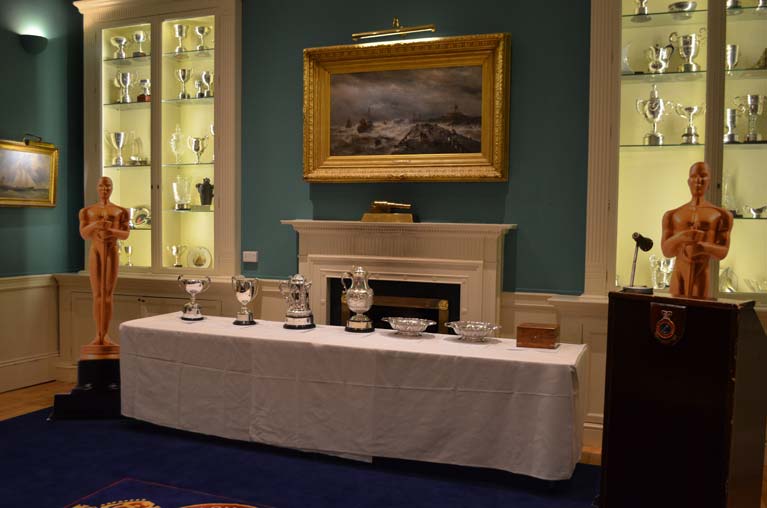 The RSTGYC Sailing Trophies ready for presentation
The RSTGYC Sailing Trophies ready for presentation
The awards recognised high-level performances across dinghies and keelboats, including Michael O'Connor and Davy Taylor's victory in the All Ireland Sailing Championship. Michael was presented with the Enriquetta Cup, while Frank O'Beirne and Kieron Guilfoyle were awarded the O'Hanlon Cup for their cruising adventure as featured in Afloat and recognised by the ICC.
David Williams of the Water Wag class was a worthy winner of the Waterfront Award for his significant contribution to sailing which has seen a strong resurgence in the class with new boats, class members and a great mix of high-quality racing and great social scene.
The Commodores Cup was won by Lady Rowena (David Bolger and Crew) who won their class in the Cruising Division of the Dun Laoghaire to Dingle and were proud recipients of the Sam and Emma Trophy.
For the second year in a row Tom Higgins was presented with The Vice Commodores Cup. Tom's Championship results for 2019 are Laser Radial Youth World Championships, 5th place overall. Winner, Andalusia Olympic Week, Laser Radial. Laser Radial Europa Cup, Hyeres, 6th place overall. Laser Radial Europa Cup, Lake Garda, 7th place overall. Laser Radial Nationals, 2nd place overall. Royal Yachting Association NI Laser Radial Youth Nationals, Open Champion. Leinster Schools' Team Racing Champions, Gonzaga College. Tom is sailing both the Radial and Standard rig in 2020 and will compete in Genoa for the Irish Olympic spot at the Tokyo 2020 games. Tom is captain of the Gonzaga College Sailing Team in 2020.
Jessica Riordan was the winner of the Youth Award. Jessica has had a very strong 2019. She was first girl at Irish trials and competed in Optimist European Championships at Crozon in France. She was first girl at British Nationals at Weymouth. She was first girl at Irish Nationals and won a gold ISA medal. She has competed at the North Americans and at several events in Europe and is on Winner team for the second consecutive year and was ranked 6th in the rankings for the year and Top Girl Overall.
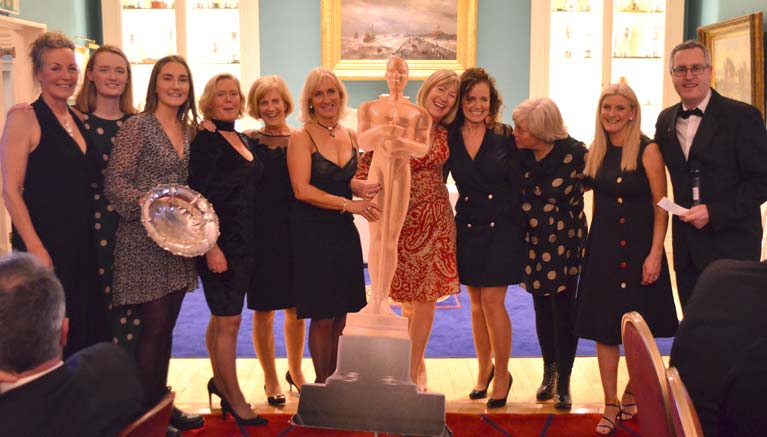 The sailors representing the RStGYC at the Irish Sailing Pathfinder Women at the Helm Regatta Winners of the Causeway Trophy
The sailors representing the RStGYC at the Irish Sailing Pathfinder Women at the Helm Regatta Winners of the Causeway Trophy
The Causeway Trophy was won by 'Team George' who were the sailors representing the RSGYC at the Irish Sailing Pathfinder Women at the Helm Regatta. They were the Inaugural winners of The Roy Family Trophy- The Overall Club Team Trophy. The team consisted of skippers Helen O'Beirne (Laser Radial) Grace O'Beirne (420) and the Under 25 Team skippered by Niamh Henry. In a very strong showing by the RSGYC Louise McKenna won the "Silver Sailor" prize for helms over 60 and the PY Trophy (Fireball), Grace O' Beirne (420). In the Laser Radial Helen O' Beirne, Shirley Gilmore and Ali Robinson were on the podium along with Sarah Byrne for the SB20. Superb sailing by the RSGYC Club members taking home seven prizes in what by all accounts was a great regatta.
Speaking at the prize-giving, RStGYC Commodore Peter Bowring paid a special tribute to the performance of the club's youth sailors who excelled across team racing and in Optimist, Feva and Laser classes and especially the female club members. He also thanked the large pool of volunteers who gave generously of their time to support the club in hosting events.
The club is looking forward to another busy season on the water with Lift-in confirmed for April 4th and the annual RSGYC Club Regatta on Saturday 4th July.
Royal St. George Yacht Club Hosts Leinster Team Racing (UPDATED)
Update Saturday 14 March: Due to the evolving situation with the COVID-19 Virus and that all schools are currently closed, this event is postponed for this term.
Royal St George sailing manager Ronan Adams says: “Discussions are ongoing as to when the Leinster Championships and National Championships will take place and the Irish Team Racing Association will update all school representatives as soon as is reasonably possible.”
Dun Laoghaire's Royal Saint George Yacht Club is once again hosting the Leinster Schools Team Racing event on Wednesday the 11th of March.
The event is open to all schools in the Province of Leinster. In the event of bad weather, there is a fall back date for the 25th of March.
As Afloat reported in 2019, Gonzaga College were Leinster Championship victors after eight teams competed in Firefly dinghies for the title in mostly light airs in Dun Laoghaire harbour.
The Royal St. George leads the way in Irish Team Racing affairs with Junior, Schools, Youth and Adult Team Racing squads training and competing locally, nationally and internationally from the club. Queries can be made to Eunice Kennedy, Leinster Schools Team Racing Representative at the following email:- [email protected]
Barry Hayes from UK Sailmakers Ireland is at the Royal St George Yacht Club on Dublin Bay to talk about sail trim and boat optimisation for cruiser-racers on January 30th.
Hayes worked as a sailmaker in Ireland for five years under Des McWilliam. He then worked in New York on the east coast for UK Sailmakers for four years and also in Hong Kong.
In 2017, Hayes purchased the sailing loft from McWilliam and today is the director of UK Sails Ireland.
Interestingly, the Cork Harbour based sailmaker is planning to split the RStGYC talk in half. The first session is on sail trim and the second half deals with deck gear, winches, servicing and maintenance plus layout with a hands-on workshop showing how to correctly and easily service winches.
Booking and further details here
Mark Hassett is Sailor of the Month (Team Racing) for November 2019
The 71st annual National Team Racing Championship hosted by Royal St George YC in the mid-November weekend attracted 16 squads from all over Ireland, and it was one of the furthest-travelled teams - Baltimore Sailing Club - which went home with the honours after a convincing 3-0 win in the finals against a hyper-talented squad – including an Olympic sailor – which sailed under the moniker of Fast Not Furious. Ably led by West Cork-based sailor Mark Hassett, Baltimore kept their cool against everything that the rest of Ireland and particularly Leinster could throw at them, and Captain Mark Hassett carries the “Sailor of the Month” honour on behalf of his team-mates Fionnn Lyden, Johnny Durcan, Amy Harrington, Trudy O’Hara and Adam Hyland.



























